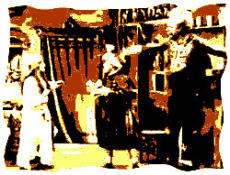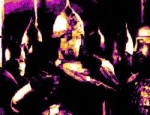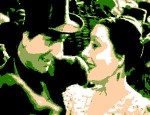Film Review
In his early years at Pathé, Albert Capellani cut his directing teeth
on a series of shorts, mostly in the conventional melodrama line, but occasionally
he ventured into more ambitious territory.
Aladin ou la Lampe merveilleuse
was one of his few excursions into the realm of pure fantasy, an inspired
retelling of the popular Aladdin story on which he was admirably well-served
by his cinematographer Segundo de Chomón, a great pioneer of film
amination who contributed the film's astonishing special effects. The
film's most obvious influence is the Georges Méliès short
Le Voyage dans la lune
(1902), which was widely imitated by filmmakers on both sides of the Atlantic,
to varying degrees of success.
Even though the similarities with Méliès's film are pretty
blatant (owing to the fact that copyright in film was virtually non-existent
at the time), Capellani's
Arabian Nights fantasy has its own distinctive
charm and distinguishes itself with its more sophisticated story and an unflagging
sense of fun that appeals to children and adults at different levels. With
its exotic painted blackdrops, bravura camera trickery and wild comic escapades,
nothing could be further from the films that Albert Capellani is now best
remembered for - his strikingly realist literary adaptations
Les Misérables
(1913) and
Germinal (1913).
The special effect that Méliès is most famous for, his so-called
substitution trick, is put to good use by Capellani and de Chomón
and provides their film with its moments of pure magic. The spectacle
of lithe satyr-like demons bursting into existence in tight-fitting spangly
leotards is enough to make you fall out of your seat in surprise, but more impressive
are the effects that you hardly notice - such as Aladdin and his mum suddenly
acquiring a new wardrobe as they spin through 360 degrees, a full seventy
years before Lynda Carter got the knack of it in her TV series
Wonder
Woman. The party scene at the end of the film - the most obvious
'homage' to Méliès's lunar adventure - offers an early attempt
at colorisation, with each frame meticulously painted by hand.
Aladin ou la Lampe merveilleuse packs a huge amount of narrative content
into its modest 12 minute runtime, with so many imaginative twists and turns
that it requires quite a degree of concentration to keep up with it. Can
this be the earliest film depicting a dream within a dream? It's no
surprise that this was one of Capellani's most widely seen films. What
is surprising is how thoroughly entertaining it still is and how well
the visual trickery holds up, despite the huge advances that have been made
in special effects over the past century. It's a fantasy extravaganza
that compels you to watch it again and again - the first three times to fully
make sense of the plot, another five times to take in all the gags and effects,
then as many times as you want afterwards to enjoy it in its glorious madcap
entirety - pure escapist fun, lovingly crafted by two of cinema's pioneering
geniuses.
© James Travers 2016
The above content is owned by frenchfilms.org and must not be copied.
Next Albert Capellani film:
L'Assommoir (1908)
Film Synopsis
Whilst his mother is busy sewing, a young man named Aladdin is happily dreaming
that he is a rich man courting the Sultan's beautiful daughter. Alas,
the dream ends too soon and, woken by his mother, Aladdin finds himself back
in his dreary old life. In the street, he is cheered by the spectacle
of the princess on horseback. She even smiles at him, but guards push
him away when he tries to approach her. Seeing the young man's distress,
a strange man in a beard befriends him and takes him to a cave. On
the ground in front of the cave is a trapdoor which the stranger opens as
if by magic. Aladdin enters an underground lair with his friend and
finds two vases that are spilling over with coins. When he approaches the
vases they acquire demonic faces that scare him away.
Exploring further, Aladdin finds a mysterious lantern, but before he
can escape with this treasure the bearded man disappears, sealing the lair
as he goes. A sprite then appears from nowhere and Aladdin can go free,
anxious to show his discovery to his mother. Rubbing the lamp, Aladdin conjures
up a tall genie, who grants him whatever he wishes. Naturally, the
young man asks for food, some new clothes and more respectable household
furnishings. In his new finery, Aladdin can now call on the Sultan
and ask for his daughter's hand in marriage. Impressed by a demonstration
of the lamp's powers, the Sultan surrenders his daughter willingly.
Just when Aladdin could not be happier, who should appear but the strange
bearded man, who promptly seizes the princess and absconds with her.
Aladdin wakes up to find himself back in his miserable hovel - it has all
been a dream! The sad young man goes out into the street and gives
his last coin to an old woman, who suddenly turns into a beautiful fairy
and presents him with a knife. With this weapon, Aladdin is able to
rescue the princess as the bearded man tries to abduct her, and in his gratitude
the Sultan offers her to the brave young man as his bride. Aladdin's
triumph is celebrated with an extravagant wedding party.
© James Travers
The above content is owned by frenchfilms.org and must not be copied.


